Individual Employee Personality Impact on Team Performance - TMGT602
VerifiedAdded on 2023/01/17
|8
|2164
|33
Report
AI Summary
This report examines the impact of individual employee personality on team dynamics within an organizational context. It begins by defining personality and introducing the "Big Five" framework (Openness, Conscientiousness, Extraversion, Agreeableness, and Emotional Stability) and how these traits affect employee interaction and performance. The report then explores factors influencing team dynamics, such as open communication and innovation. It emphasizes the importance of individual personality and team dynamics for organizational success, highlighting how high-performing teams leverage individual strengths. The report discusses the ACHIEVE model and the IPIP-NEO tool for assessing personality traits within an organizational culture. Finally, it concludes by emphasizing the need for secure communication and team-building activities to foster healthy workplace relationships. The report also provides a summary of the references used, which include studies and articles on the topic.
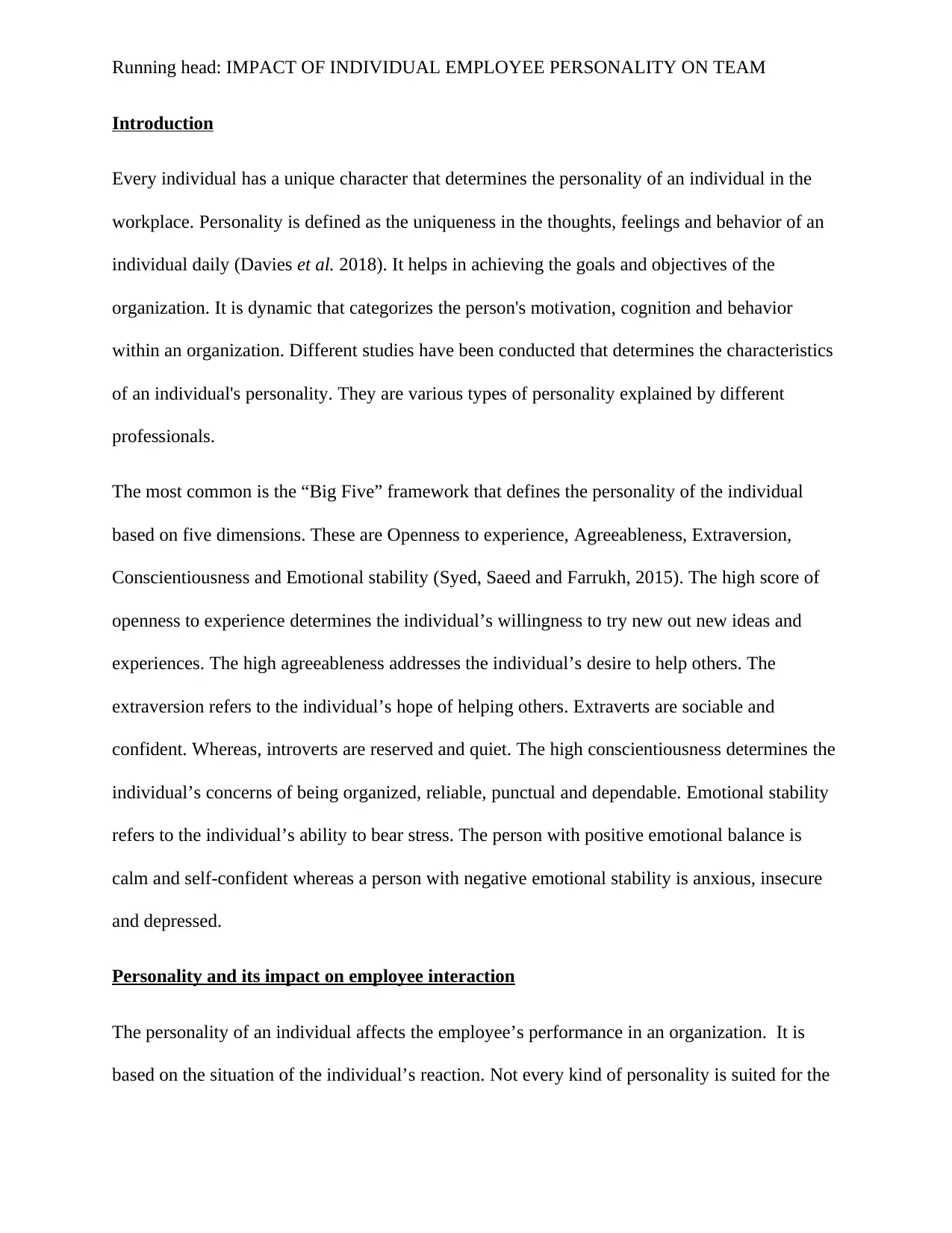
Running head: IMPACT OF INDIVIDUAL EMPLOYEE PERSONALITY ON TEAM
Introduction
Every individual has a unique character that determines the personality of an individual in the
workplace. Personality is defined as the uniqueness in the thoughts, feelings and behavior of an
individual daily (Davies et al. 2018). It helps in achieving the goals and objectives of the
organization. It is dynamic that categorizes the person's motivation, cognition and behavior
within an organization. Different studies have been conducted that determines the characteristics
of an individual's personality. They are various types of personality explained by different
professionals.
The most common is the “Big Five” framework that defines the personality of the individual
based on five dimensions. These are Openness to experience, Agreeableness, Extraversion,
Conscientiousness and Emotional stability (Syed, Saeed and Farrukh, 2015). The high score of
openness to experience determines the individual’s willingness to try new out new ideas and
experiences. The high agreeableness addresses the individual’s desire to help others. The
extraversion refers to the individual’s hope of helping others. Extraverts are sociable and
confident. Whereas, introverts are reserved and quiet. The high conscientiousness determines the
individual’s concerns of being organized, reliable, punctual and dependable. Emotional stability
refers to the individual’s ability to bear stress. The person with positive emotional balance is
calm and self-confident whereas a person with negative emotional stability is anxious, insecure
and depressed.
Personality and its impact on employee interaction
The personality of an individual affects the employee’s performance in an organization. It is
based on the situation of the individual’s reaction. Not every kind of personality is suited for the
Introduction
Every individual has a unique character that determines the personality of an individual in the
workplace. Personality is defined as the uniqueness in the thoughts, feelings and behavior of an
individual daily (Davies et al. 2018). It helps in achieving the goals and objectives of the
organization. It is dynamic that categorizes the person's motivation, cognition and behavior
within an organization. Different studies have been conducted that determines the characteristics
of an individual's personality. They are various types of personality explained by different
professionals.
The most common is the “Big Five” framework that defines the personality of the individual
based on five dimensions. These are Openness to experience, Agreeableness, Extraversion,
Conscientiousness and Emotional stability (Syed, Saeed and Farrukh, 2015). The high score of
openness to experience determines the individual’s willingness to try new out new ideas and
experiences. The high agreeableness addresses the individual’s desire to help others. The
extraversion refers to the individual’s hope of helping others. Extraverts are sociable and
confident. Whereas, introverts are reserved and quiet. The high conscientiousness determines the
individual’s concerns of being organized, reliable, punctual and dependable. Emotional stability
refers to the individual’s ability to bear stress. The person with positive emotional balance is
calm and self-confident whereas a person with negative emotional stability is anxious, insecure
and depressed.
Personality and its impact on employee interaction
The personality of an individual affects the employee’s performance in an organization. It is
based on the situation of the individual’s reaction. Not every kind of personality is suited for the
Paraphrase This Document
Need a fresh take? Get an instant paraphrase of this document with our AI Paraphraser
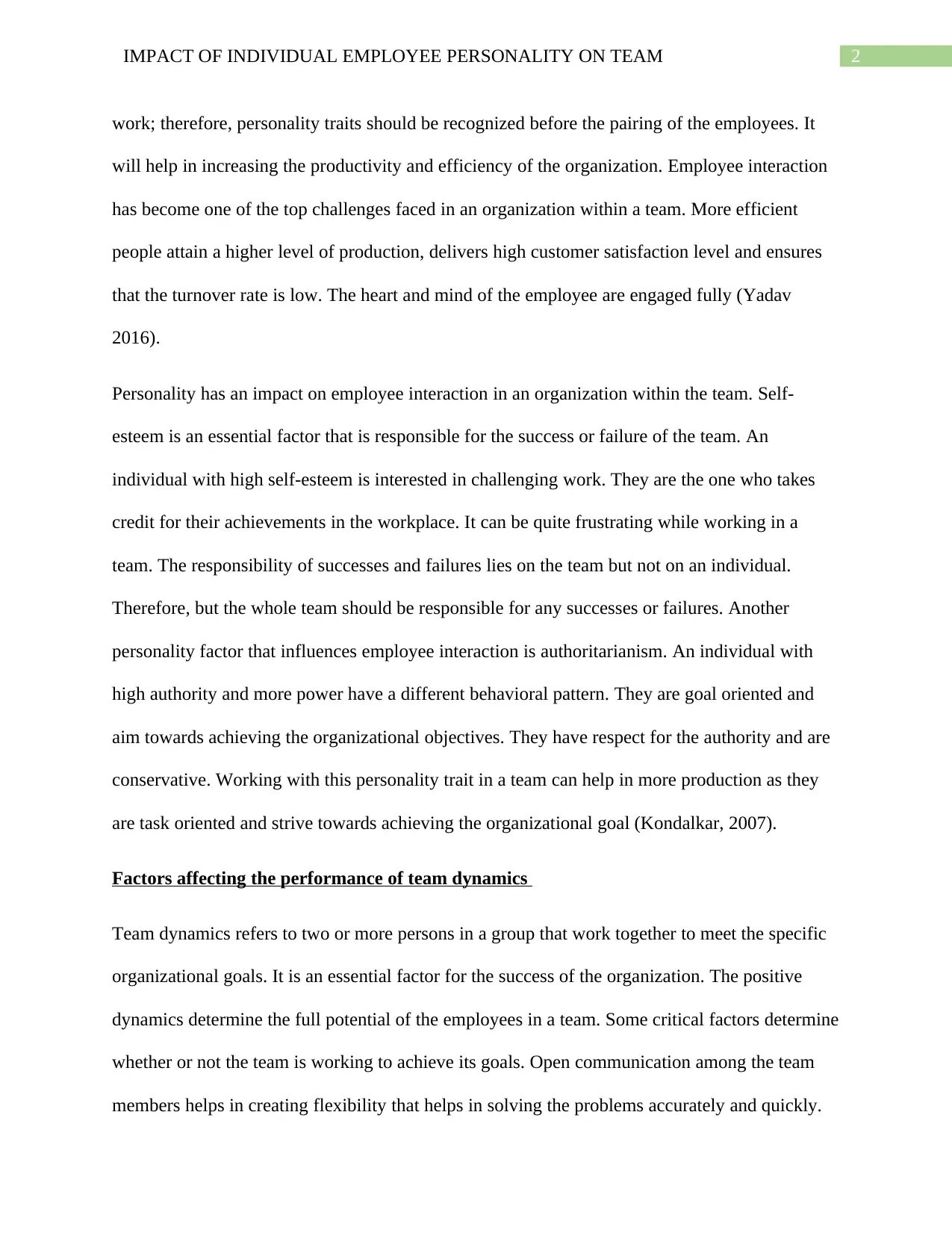
2IMPACT OF INDIVIDUAL EMPLOYEE PERSONALITY ON TEAM
work; therefore, personality traits should be recognized before the pairing of the employees. It
will help in increasing the productivity and efficiency of the organization. Employee interaction
has become one of the top challenges faced in an organization within a team. More efficient
people attain a higher level of production, delivers high customer satisfaction level and ensures
that the turnover rate is low. The heart and mind of the employee are engaged fully (Yadav
2016).
Personality has an impact on employee interaction in an organization within the team. Self-
esteem is an essential factor that is responsible for the success or failure of the team. An
individual with high self-esteem is interested in challenging work. They are the one who takes
credit for their achievements in the workplace. It can be quite frustrating while working in a
team. The responsibility of successes and failures lies on the team but not on an individual.
Therefore, but the whole team should be responsible for any successes or failures. Another
personality factor that influences employee interaction is authoritarianism. An individual with
high authority and more power have a different behavioral pattern. They are goal oriented and
aim towards achieving the organizational objectives. They have respect for the authority and are
conservative. Working with this personality trait in a team can help in more production as they
are task oriented and strive towards achieving the organizational goal (Kondalkar, 2007).
Factors affecting the performance of team dynamics
Team dynamics refers to two or more persons in a group that work together to meet the specific
organizational goals. It is an essential factor for the success of the organization. The positive
dynamics determine the full potential of the employees in a team. Some critical factors determine
whether or not the team is working to achieve its goals. Open communication among the team
members helps in creating flexibility that helps in solving the problems accurately and quickly.
work; therefore, personality traits should be recognized before the pairing of the employees. It
will help in increasing the productivity and efficiency of the organization. Employee interaction
has become one of the top challenges faced in an organization within a team. More efficient
people attain a higher level of production, delivers high customer satisfaction level and ensures
that the turnover rate is low. The heart and mind of the employee are engaged fully (Yadav
2016).
Personality has an impact on employee interaction in an organization within the team. Self-
esteem is an essential factor that is responsible for the success or failure of the team. An
individual with high self-esteem is interested in challenging work. They are the one who takes
credit for their achievements in the workplace. It can be quite frustrating while working in a
team. The responsibility of successes and failures lies on the team but not on an individual.
Therefore, but the whole team should be responsible for any successes or failures. Another
personality factor that influences employee interaction is authoritarianism. An individual with
high authority and more power have a different behavioral pattern. They are goal oriented and
aim towards achieving the organizational objectives. They have respect for the authority and are
conservative. Working with this personality trait in a team can help in more production as they
are task oriented and strive towards achieving the organizational goal (Kondalkar, 2007).
Factors affecting the performance of team dynamics
Team dynamics refers to two or more persons in a group that work together to meet the specific
organizational goals. It is an essential factor for the success of the organization. The positive
dynamics determine the full potential of the employees in a team. Some critical factors determine
whether or not the team is working to achieve its goals. Open communication among the team
members helps in creating flexibility that helps in solving the problems accurately and quickly.
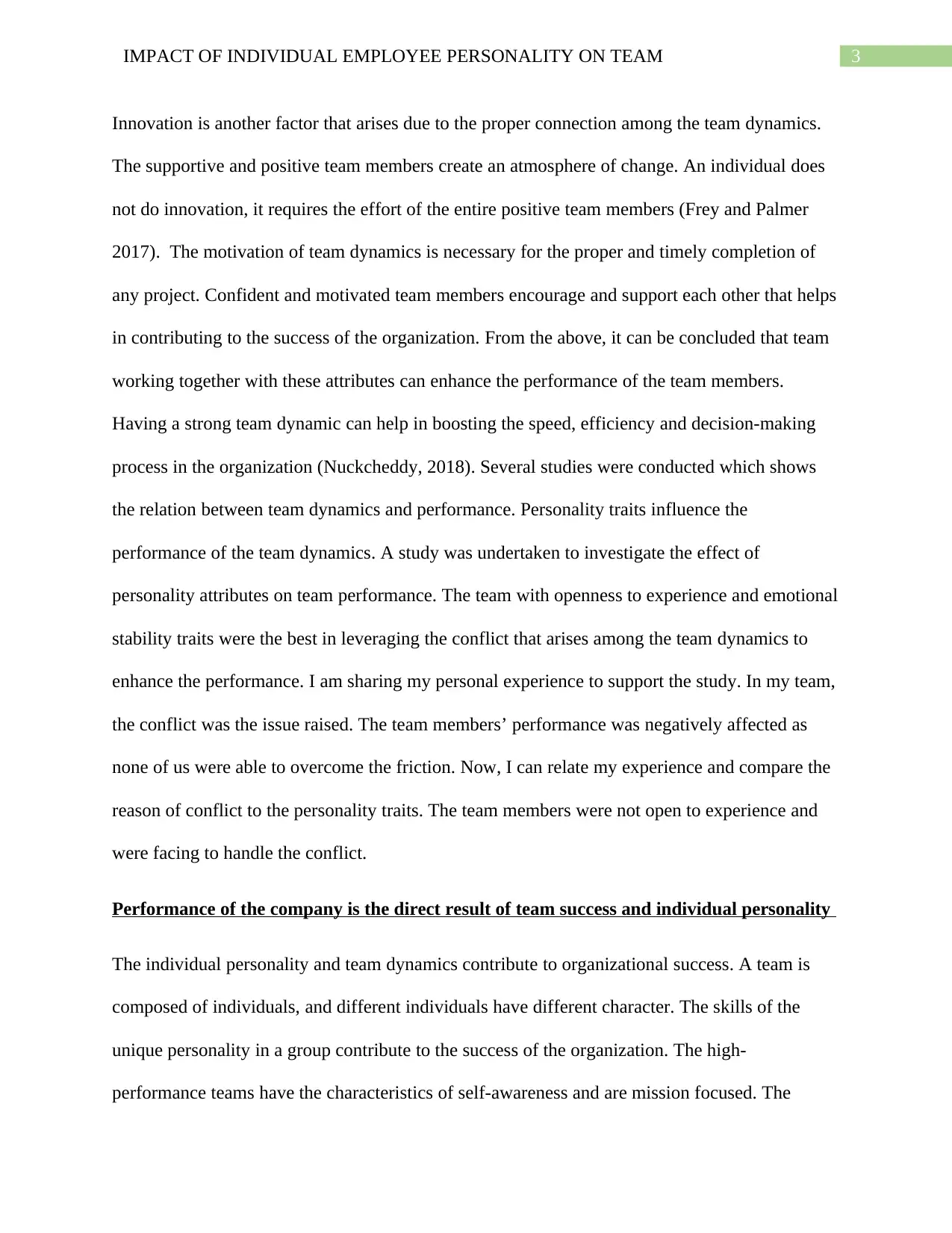
3IMPACT OF INDIVIDUAL EMPLOYEE PERSONALITY ON TEAM
Innovation is another factor that arises due to the proper connection among the team dynamics.
The supportive and positive team members create an atmosphere of change. An individual does
not do innovation, it requires the effort of the entire positive team members (Frey and Palmer
2017). The motivation of team dynamics is necessary for the proper and timely completion of
any project. Confident and motivated team members encourage and support each other that helps
in contributing to the success of the organization. From the above, it can be concluded that team
working together with these attributes can enhance the performance of the team members.
Having a strong team dynamic can help in boosting the speed, efficiency and decision-making
process in the organization (Nuckcheddy, 2018). Several studies were conducted which shows
the relation between team dynamics and performance. Personality traits influence the
performance of the team dynamics. A study was undertaken to investigate the effect of
personality attributes on team performance. The team with openness to experience and emotional
stability traits were the best in leveraging the conflict that arises among the team dynamics to
enhance the performance. I am sharing my personal experience to support the study. In my team,
the conflict was the issue raised. The team members’ performance was negatively affected as
none of us were able to overcome the friction. Now, I can relate my experience and compare the
reason of conflict to the personality traits. The team members were not open to experience and
were facing to handle the conflict.
Performance of the company is the direct result of team success and individual personality
The individual personality and team dynamics contribute to organizational success. A team is
composed of individuals, and different individuals have different character. The skills of the
unique personality in a group contribute to the success of the organization. The high-
performance teams have the characteristics of self-awareness and are mission focused. The
Innovation is another factor that arises due to the proper connection among the team dynamics.
The supportive and positive team members create an atmosphere of change. An individual does
not do innovation, it requires the effort of the entire positive team members (Frey and Palmer
2017). The motivation of team dynamics is necessary for the proper and timely completion of
any project. Confident and motivated team members encourage and support each other that helps
in contributing to the success of the organization. From the above, it can be concluded that team
working together with these attributes can enhance the performance of the team members.
Having a strong team dynamic can help in boosting the speed, efficiency and decision-making
process in the organization (Nuckcheddy, 2018). Several studies were conducted which shows
the relation between team dynamics and performance. Personality traits influence the
performance of the team dynamics. A study was undertaken to investigate the effect of
personality attributes on team performance. The team with openness to experience and emotional
stability traits were the best in leveraging the conflict that arises among the team dynamics to
enhance the performance. I am sharing my personal experience to support the study. In my team,
the conflict was the issue raised. The team members’ performance was negatively affected as
none of us were able to overcome the friction. Now, I can relate my experience and compare the
reason of conflict to the personality traits. The team members were not open to experience and
were facing to handle the conflict.
Performance of the company is the direct result of team success and individual personality
The individual personality and team dynamics contribute to organizational success. A team is
composed of individuals, and different individuals have different character. The skills of the
unique personality in a group contribute to the success of the organization. The high-
performance teams have the characteristics of self-awareness and are mission focused. The
⊘ This is a preview!⊘
Do you want full access?
Subscribe today to unlock all pages.

Trusted by 1+ million students worldwide
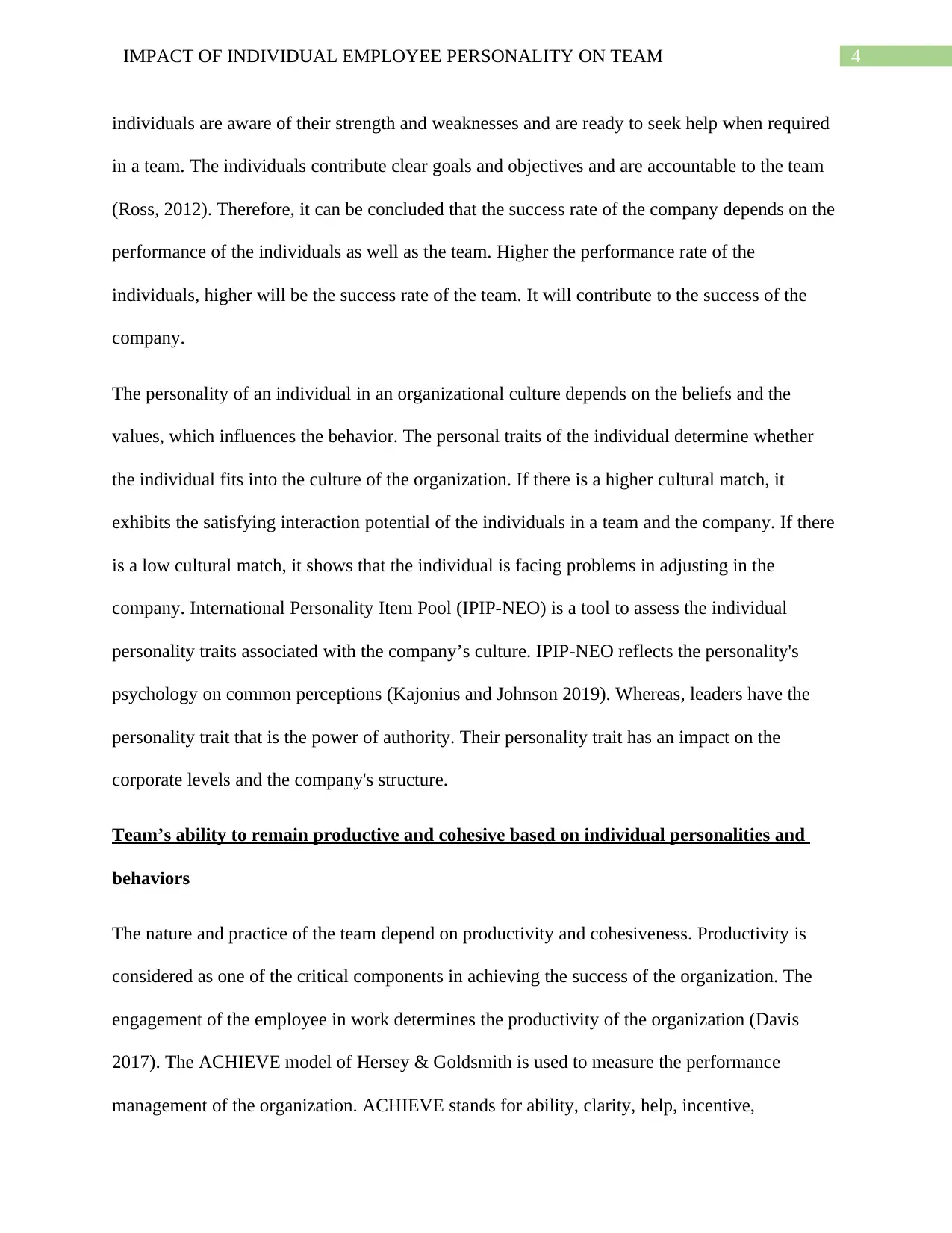
4IMPACT OF INDIVIDUAL EMPLOYEE PERSONALITY ON TEAM
individuals are aware of their strength and weaknesses and are ready to seek help when required
in a team. The individuals contribute clear goals and objectives and are accountable to the team
(Ross, 2012). Therefore, it can be concluded that the success rate of the company depends on the
performance of the individuals as well as the team. Higher the performance rate of the
individuals, higher will be the success rate of the team. It will contribute to the success of the
company.
The personality of an individual in an organizational culture depends on the beliefs and the
values, which influences the behavior. The personal traits of the individual determine whether
the individual fits into the culture of the organization. If there is a higher cultural match, it
exhibits the satisfying interaction potential of the individuals in a team and the company. If there
is a low cultural match, it shows that the individual is facing problems in adjusting in the
company. International Personality Item Pool (IPIP-NEO) is a tool to assess the individual
personality traits associated with the company’s culture. IPIP-NEO reflects the personality's
psychology on common perceptions (Kajonius and Johnson 2019). Whereas, leaders have the
personality trait that is the power of authority. Their personality trait has an impact on the
corporate levels and the company's structure.
Team’s ability to remain productive and cohesive based on individual personalities and
behaviors
The nature and practice of the team depend on productivity and cohesiveness. Productivity is
considered as one of the critical components in achieving the success of the organization. The
engagement of the employee in work determines the productivity of the organization (Davis
2017). The ACHIEVE model of Hersey & Goldsmith is used to measure the performance
management of the organization. ACHIEVE stands for ability, clarity, help, incentive,
individuals are aware of their strength and weaknesses and are ready to seek help when required
in a team. The individuals contribute clear goals and objectives and are accountable to the team
(Ross, 2012). Therefore, it can be concluded that the success rate of the company depends on the
performance of the individuals as well as the team. Higher the performance rate of the
individuals, higher will be the success rate of the team. It will contribute to the success of the
company.
The personality of an individual in an organizational culture depends on the beliefs and the
values, which influences the behavior. The personal traits of the individual determine whether
the individual fits into the culture of the organization. If there is a higher cultural match, it
exhibits the satisfying interaction potential of the individuals in a team and the company. If there
is a low cultural match, it shows that the individual is facing problems in adjusting in the
company. International Personality Item Pool (IPIP-NEO) is a tool to assess the individual
personality traits associated with the company’s culture. IPIP-NEO reflects the personality's
psychology on common perceptions (Kajonius and Johnson 2019). Whereas, leaders have the
personality trait that is the power of authority. Their personality trait has an impact on the
corporate levels and the company's structure.
Team’s ability to remain productive and cohesive based on individual personalities and
behaviors
The nature and practice of the team depend on productivity and cohesiveness. Productivity is
considered as one of the critical components in achieving the success of the organization. The
engagement of the employee in work determines the productivity of the organization (Davis
2017). The ACHIEVE model of Hersey & Goldsmith is used to measure the performance
management of the organization. ACHIEVE stands for ability, clarity, help, incentive,
Paraphrase This Document
Need a fresh take? Get an instant paraphrase of this document with our AI Paraphraser
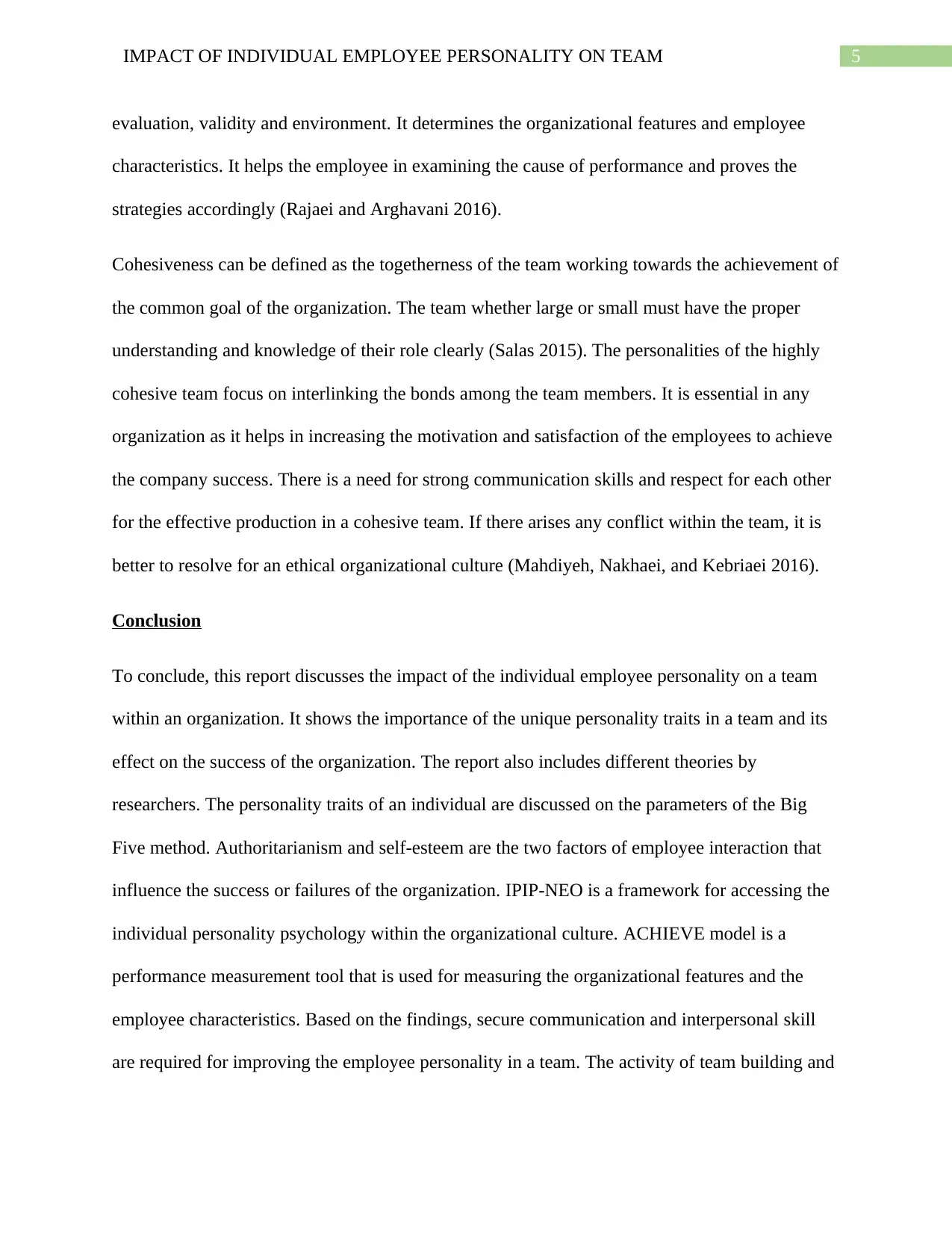
5IMPACT OF INDIVIDUAL EMPLOYEE PERSONALITY ON TEAM
evaluation, validity and environment. It determines the organizational features and employee
characteristics. It helps the employee in examining the cause of performance and proves the
strategies accordingly (Rajaei and Arghavani 2016).
Cohesiveness can be defined as the togetherness of the team working towards the achievement of
the common goal of the organization. The team whether large or small must have the proper
understanding and knowledge of their role clearly (Salas 2015). The personalities of the highly
cohesive team focus on interlinking the bonds among the team members. It is essential in any
organization as it helps in increasing the motivation and satisfaction of the employees to achieve
the company success. There is a need for strong communication skills and respect for each other
for the effective production in a cohesive team. If there arises any conflict within the team, it is
better to resolve for an ethical organizational culture (Mahdiyeh, Nakhaei, and Kebriaei 2016).
Conclusion
To conclude, this report discusses the impact of the individual employee personality on a team
within an organization. It shows the importance of the unique personality traits in a team and its
effect on the success of the organization. The report also includes different theories by
researchers. The personality traits of an individual are discussed on the parameters of the Big
Five method. Authoritarianism and self-esteem are the two factors of employee interaction that
influence the success or failures of the organization. IPIP-NEO is a framework for accessing the
individual personality psychology within the organizational culture. ACHIEVE model is a
performance measurement tool that is used for measuring the organizational features and the
employee characteristics. Based on the findings, secure communication and interpersonal skill
are required for improving the employee personality in a team. The activity of team building and
evaluation, validity and environment. It determines the organizational features and employee
characteristics. It helps the employee in examining the cause of performance and proves the
strategies accordingly (Rajaei and Arghavani 2016).
Cohesiveness can be defined as the togetherness of the team working towards the achievement of
the common goal of the organization. The team whether large or small must have the proper
understanding and knowledge of their role clearly (Salas 2015). The personalities of the highly
cohesive team focus on interlinking the bonds among the team members. It is essential in any
organization as it helps in increasing the motivation and satisfaction of the employees to achieve
the company success. There is a need for strong communication skills and respect for each other
for the effective production in a cohesive team. If there arises any conflict within the team, it is
better to resolve for an ethical organizational culture (Mahdiyeh, Nakhaei, and Kebriaei 2016).
Conclusion
To conclude, this report discusses the impact of the individual employee personality on a team
within an organization. It shows the importance of the unique personality traits in a team and its
effect on the success of the organization. The report also includes different theories by
researchers. The personality traits of an individual are discussed on the parameters of the Big
Five method. Authoritarianism and self-esteem are the two factors of employee interaction that
influence the success or failures of the organization. IPIP-NEO is a framework for accessing the
individual personality psychology within the organizational culture. ACHIEVE model is a
performance measurement tool that is used for measuring the organizational features and the
employee characteristics. Based on the findings, secure communication and interpersonal skill
are required for improving the employee personality in a team. The activity of team building and
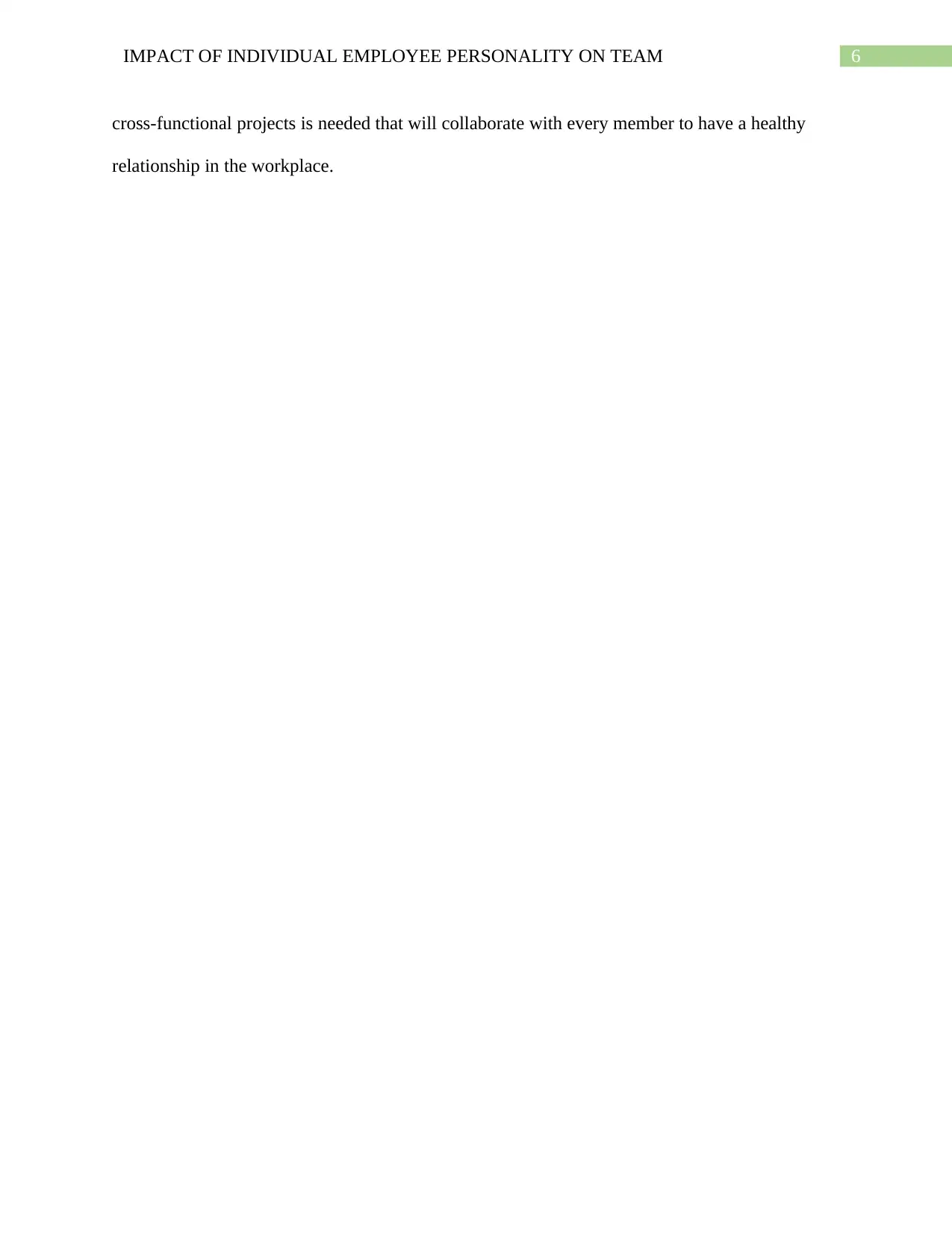
6IMPACT OF INDIVIDUAL EMPLOYEE PERSONALITY ON TEAM
cross-functional projects is needed that will collaborate with every member to have a healthy
relationship in the workplace.
cross-functional projects is needed that will collaborate with every member to have a healthy
relationship in the workplace.
⊘ This is a preview!⊘
Do you want full access?
Subscribe today to unlock all pages.

Trusted by 1+ million students worldwide
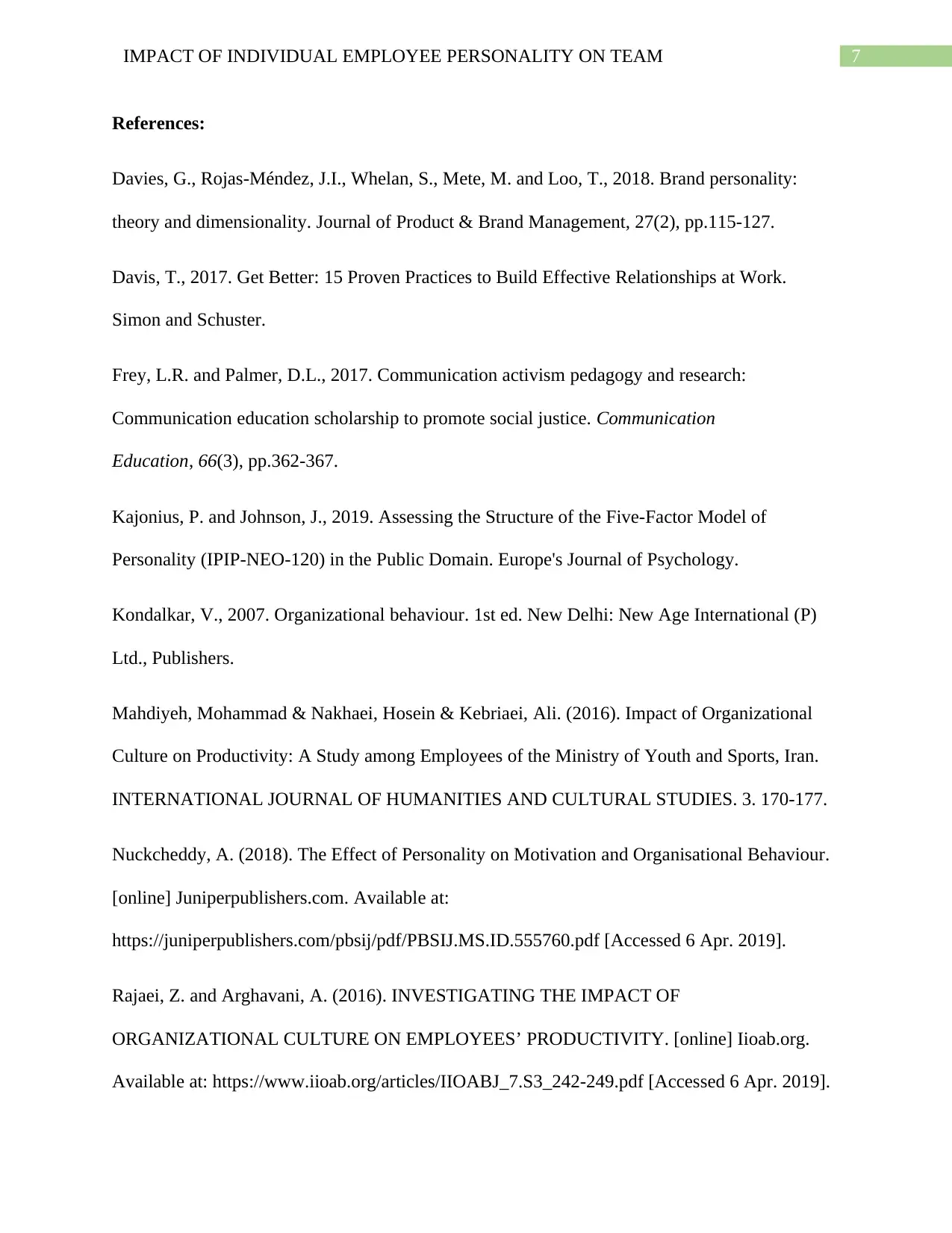
7IMPACT OF INDIVIDUAL EMPLOYEE PERSONALITY ON TEAM
References:
Davies, G., Rojas-Méndez, J.I., Whelan, S., Mete, M. and Loo, T., 2018. Brand personality:
theory and dimensionality. Journal of Product & Brand Management, 27(2), pp.115-127.
Davis, T., 2017. Get Better: 15 Proven Practices to Build Effective Relationships at Work.
Simon and Schuster.
Frey, L.R. and Palmer, D.L., 2017. Communication activism pedagogy and research:
Communication education scholarship to promote social justice. Communication
Education, 66(3), pp.362-367.
Kajonius, P. and Johnson, J., 2019. Assessing the Structure of the Five-Factor Model of
Personality (IPIP-NEO-120) in the Public Domain. Europe's Journal of Psychology.
Kondalkar, V., 2007. Organizational behaviour. 1st ed. New Delhi: New Age International (P)
Ltd., Publishers.
Mahdiyeh, Mohammad & Nakhaei, Hosein & Kebriaei, Ali. (2016). Impact of Organizational
Culture on Productivity: A Study among Employees of the Ministry of Youth and Sports, Iran.
INTERNATIONAL JOURNAL OF HUMANITIES AND CULTURAL STUDIES. 3. 170-177.
Nuckcheddy, A. (2018). The Effect of Personality on Motivation and Organisational Behaviour.
[online] Juniperpublishers.com. Available at:
https://juniperpublishers.com/pbsij/pdf/PBSIJ.MS.ID.555760.pdf [Accessed 6 Apr. 2019].
Rajaei, Z. and Arghavani, A. (2016). INVESTIGATING THE IMPACT OF
ORGANIZATIONAL CULTURE ON EMPLOYEES’ PRODUCTIVITY. [online] Iioab.org.
Available at: https://www.iioab.org/articles/IIOABJ_7.S3_242-249.pdf [Accessed 6 Apr. 2019].
References:
Davies, G., Rojas-Méndez, J.I., Whelan, S., Mete, M. and Loo, T., 2018. Brand personality:
theory and dimensionality. Journal of Product & Brand Management, 27(2), pp.115-127.
Davis, T., 2017. Get Better: 15 Proven Practices to Build Effective Relationships at Work.
Simon and Schuster.
Frey, L.R. and Palmer, D.L., 2017. Communication activism pedagogy and research:
Communication education scholarship to promote social justice. Communication
Education, 66(3), pp.362-367.
Kajonius, P. and Johnson, J., 2019. Assessing the Structure of the Five-Factor Model of
Personality (IPIP-NEO-120) in the Public Domain. Europe's Journal of Psychology.
Kondalkar, V., 2007. Organizational behaviour. 1st ed. New Delhi: New Age International (P)
Ltd., Publishers.
Mahdiyeh, Mohammad & Nakhaei, Hosein & Kebriaei, Ali. (2016). Impact of Organizational
Culture on Productivity: A Study among Employees of the Ministry of Youth and Sports, Iran.
INTERNATIONAL JOURNAL OF HUMANITIES AND CULTURAL STUDIES. 3. 170-177.
Nuckcheddy, A. (2018). The Effect of Personality on Motivation and Organisational Behaviour.
[online] Juniperpublishers.com. Available at:
https://juniperpublishers.com/pbsij/pdf/PBSIJ.MS.ID.555760.pdf [Accessed 6 Apr. 2019].
Rajaei, Z. and Arghavani, A. (2016). INVESTIGATING THE IMPACT OF
ORGANIZATIONAL CULTURE ON EMPLOYEES’ PRODUCTIVITY. [online] Iioab.org.
Available at: https://www.iioab.org/articles/IIOABJ_7.S3_242-249.pdf [Accessed 6 Apr. 2019].
Paraphrase This Document
Need a fresh take? Get an instant paraphrase of this document with our AI Paraphraser
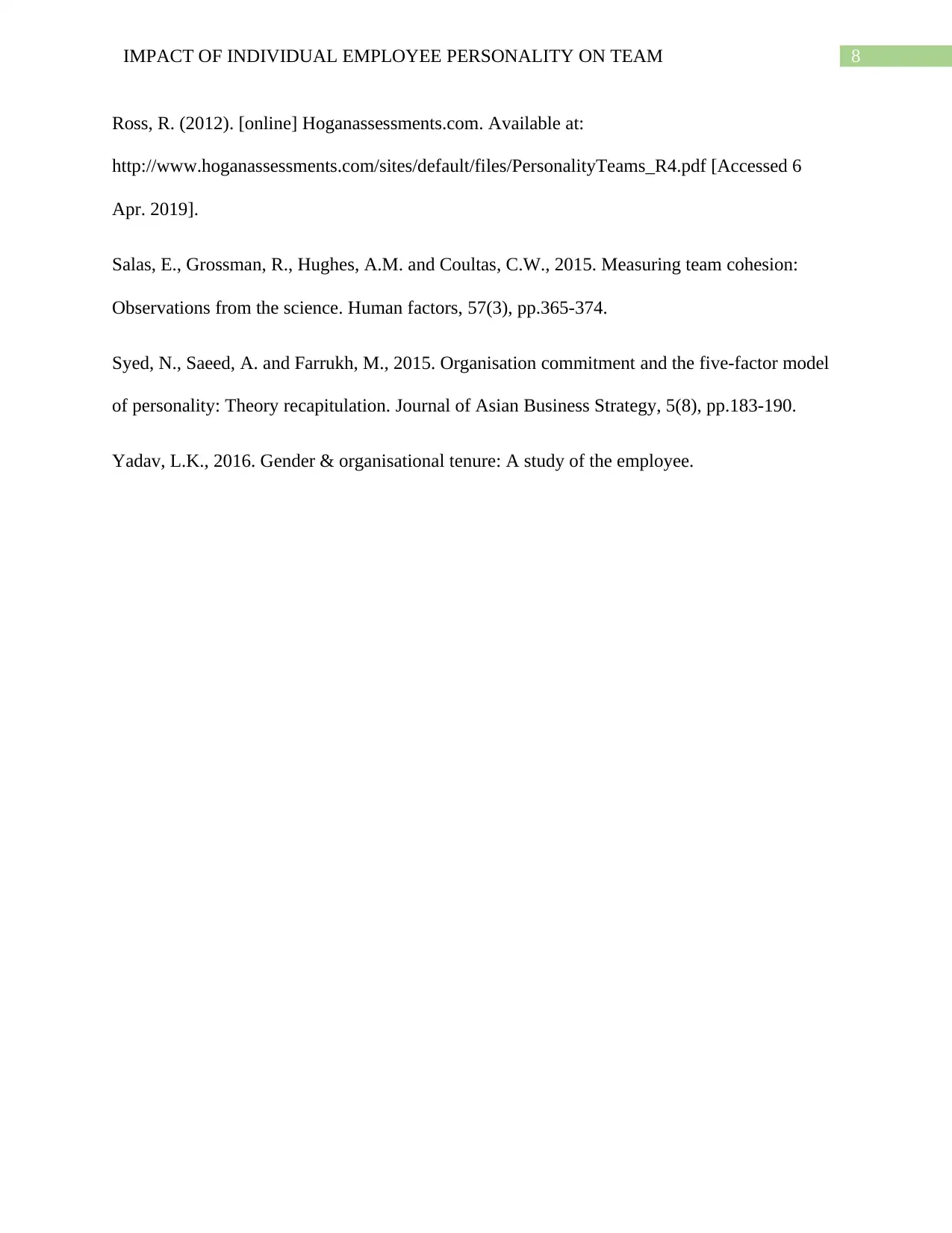
8IMPACT OF INDIVIDUAL EMPLOYEE PERSONALITY ON TEAM
Ross, R. (2012). [online] Hoganassessments.com. Available at:
http://www.hoganassessments.com/sites/default/files/PersonalityTeams_R4.pdf [Accessed 6
Apr. 2019].
Salas, E., Grossman, R., Hughes, A.M. and Coultas, C.W., 2015. Measuring team cohesion:
Observations from the science. Human factors, 57(3), pp.365-374.
Syed, N., Saeed, A. and Farrukh, M., 2015. Organisation commitment and the five-factor model
of personality: Theory recapitulation. Journal of Asian Business Strategy, 5(8), pp.183-190.
Yadav, L.K., 2016. Gender & organisational tenure: A study of the employee.
Ross, R. (2012). [online] Hoganassessments.com. Available at:
http://www.hoganassessments.com/sites/default/files/PersonalityTeams_R4.pdf [Accessed 6
Apr. 2019].
Salas, E., Grossman, R., Hughes, A.M. and Coultas, C.W., 2015. Measuring team cohesion:
Observations from the science. Human factors, 57(3), pp.365-374.
Syed, N., Saeed, A. and Farrukh, M., 2015. Organisation commitment and the five-factor model
of personality: Theory recapitulation. Journal of Asian Business Strategy, 5(8), pp.183-190.
Yadav, L.K., 2016. Gender & organisational tenure: A study of the employee.
1 out of 8
Related Documents
Your All-in-One AI-Powered Toolkit for Academic Success.
+13062052269
info@desklib.com
Available 24*7 on WhatsApp / Email
![[object Object]](/_next/static/media/star-bottom.7253800d.svg)
Unlock your academic potential
Copyright © 2020–2026 A2Z Services. All Rights Reserved. Developed and managed by ZUCOL.





